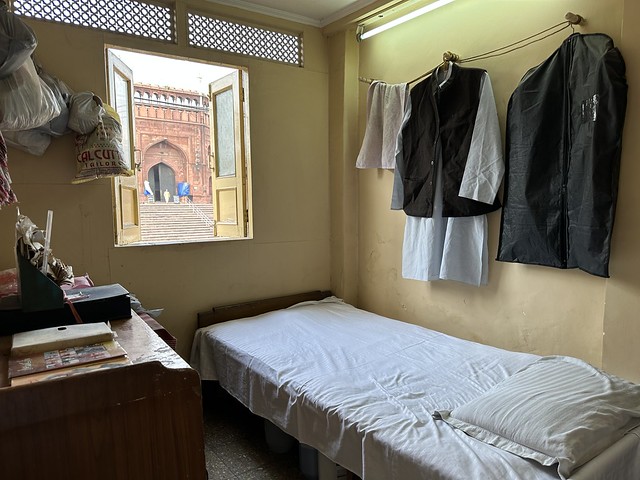
City Landmark – Poet Ameer Dehlvi’s Room, Opposite Jama Masjid

The beautiful room is empty.
[Text and photo by Mayank Austen Soofi]
The door to the left opens to the long balcony; the window in the front wall looks on to Jama Masjid. The room is an imperfect rectangle. The wall, yellow like Amul butter. The table, creamy brown. The bedspread and the pillow, white. A Jawahar cut jacket hanging on the wall. A table topped with three poetry books, including by Ustad Rasa Dehlvi.
This small so-named “manager’s room” is on the first floor of Old Delhi’s Haji Hotel. A poet spent a lifetime in it. Ameer Dehlvi passed early in the year, aged 93. His family owns the landmark hotel.
These days the room stays closed, and was unlatched briefly on request. The window is currently shuttered. A cooling darkness is expressing unswerving rest.
While his late wife lived in faraway Kashmir, and the rest of his people—-brothers, nephews,, etc—in nearby Chawri Bazar, the poet lounged and lay in this room. It had been his daily refuge for more than half a century. The meals though were always had with the family in the Chawri Bazar mansion. His other favoured place was the stately table on the hotel balcony, where he would make entries, in handwritten Urdu, in the guest check-in register.
Before Covid upended his routine, the poet would seclude himself in the room sharp at two in the afternoon. A palm-sized Sony transistor beside his pillow would play old film songs at low volume. A copy of his published verses lay within the arm’s reach. He would emerge out three hours later.
One afternoon, some heatwaves ago, it was so inhumanly hot that the normally chaotic Walled City lanes were utterly empty. The hotel balcony was also empty. The soft tunes of a song were coming from the manager’s room. The door was ajar. The poet was lying on bed, in white kurta pajama. The fabric looked as soft as Dhaka malmal. His eyes were closed, his hands lay crossed on his chest. Some of the longer strands of his grey beard were stirring slightly under the ceiling fan’s hawa.
During the pandemic-triggered lockdowns, the poet tried recreating his beloved hotel room at his Chawri Bazar home. But his heart broke during the second wave when he lost two brothers. As the world returned from isolation, he would visit this room infrequently, and sit by the window, which stayed shut, murmuring verses on loss and grief, breaking down into tears.
This summer afternoon, three months after his passing, the room exudes a museum gallery’s detachment. On opening the window, Jama Masjid dramatically resurfaces, and white-hot daylight sprints in impatiently, at once enlivening the aloof room with a throbbing feel of the poet’s presence—and also of his eternal absence. As if he is nowhere and everywhere.

Recent Comments